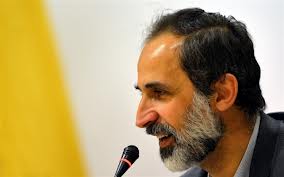 The leader of Syria’s newly united opposition has headed to Arab League headquarters in Cairo to push for diplomatic recognition, buoyed by the hard-won unity deal among the disparate factions.
The leader of Syria’s newly united opposition has headed to Arab League headquarters in Cairo to push for diplomatic recognition, buoyed by the hard-won unity deal among the disparate factions.
Mouaz al-Khatib, 52, a cleric who left Syria three months ago, was to be accompanied on Monday by Qatari Prime Minister Sheikh Hamad bin Jassem Al Thani, whose government hosted the marathon four-day talks that culminated in Sunday’s agreement.
The deal to form a new broad-based opposition structure to take the 20-month uprising forward drew a warm welcome from Western governments that had expressed mounting frustration with the leadership divisions that have plagued the revolt against president Bashar al-Assad’s regime.
The new National Coalition wants to build on that support to win the sort of diplomatic recognition that the Libyan opposition won in its successful uprising against veteran dictator Muammar Gaddafi last year.
The Arab League suspended Assad’s government as part of a raft of sanctions it imposed last year and Syria’s seat in the 22-member bloc is currently vacant.
‘Full recognition’
Qatar, which along with neighbouring Saudi Arabia has been a leading champion of the Syrian opposition, has already said it is ready to recognise a provisional government that the National Coalition plans to form.
The Qatari premier said he would press fellow Arab ministers at Monday’s talks in Cairo to do the same. “We will seek a full recognition of this new body,” Sheikh Hamad said.
Qatar’s minister of state for foreign affairs, Khaled al-Attiya, told Al Jazeera that recognition would remove any obstacles to the opposition’s securing arms for rebel fighters on the ground.
“When they get the legitimacy from the international arena they can go and contract whatever they want themselves, because they would be recognized as full legitimate government whether in exile or whether inside Syria,” he said.
The new opposition leader said that the National Coalition already had promises of weapons. “In fact there are some friends, I can’t name them, they will help us,” Khatib said.
Under Sunday’s deal, the opposition agreed to establish a new supreme military council to take overall command of the various rebel groups on the ground and address US concerns that weapons have been getting into the hands of militant groups that are in danger of hijacking the uprising.
US support
The United States swiftly declared its backing for the new structure.
“We look forward to supporting the National Coalition as it charts a course toward the end of Assad’s bloody rule and the start of the peaceful, just, democratic future that all the people of Syria deserve,” State Department deputy spokesman Mark Toner said.
Britain hailed the agreement as an “important milestone in forming a broad and representative opposition that reflects the full diversity of the Syrian people”.
Syria’s former colonial ruler France said it would extend “full support to this coalition, in order for it to become a credible alternative” to Assad’s regime.
The National Coalition also appointed two deputy leaders: prominent dissident Riad Seif, who was the architect of the new opposition structure; and secular female opposition figure Suhair al-Atassi, who hails from the central city of Homs, one of the bastions of the uprising.
A third post was left vacant for a representative of Syria’s Kurdish minority.
As the opposition unveiled its new leadership, there was no let-up in the fighting on the ground. A total of 104 people were killed on Sunday, bringing to more than 37,000 number killed since March last year, the Syrian Observatory for Human Rights said.
Al Jazeera

Leave a Reply
You must be logged in to post a comment.